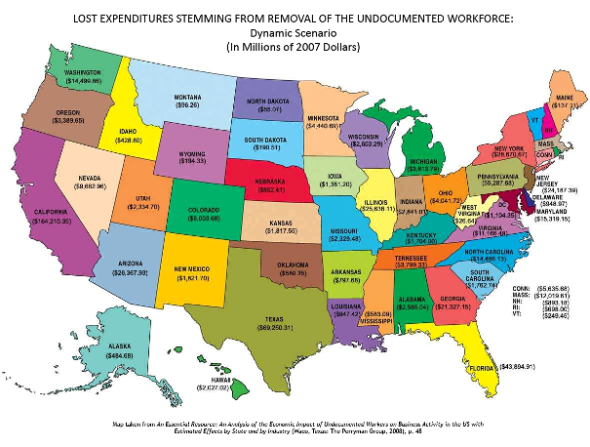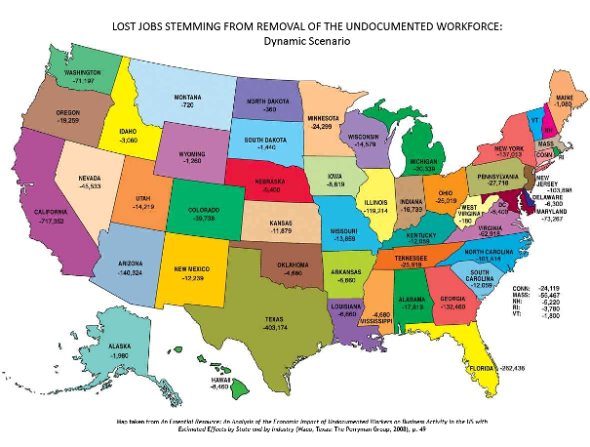Washington D.C. - On Monday, the Immigration Policy Center (IPC) hosted a teleconference with border and national-security experts who dissected the myths linking immigration and border violence. These experts shared their analyses of the reality of crime and violence along the U.S.-Mexico border, what the real sources of violence are, and how the U.S. should respond. They all made the point that nearly twenty years of immigration policy focusing on "securing the border first" has failed to address the underlying issues and criminal cartels that are the real cause of violence along the border. The experts noted that immigration laws and policies of the past two decades have, ironically, made the border less safe and have actually benefitted the traffickers and smugglers who operate at the border.
Benjamin Johnson of the American Immigration Council stressed the need to disentangle unauthorized immigration and border violence as a means for solving both problems, noting that "we are pursuing a lopsided approach of border-enforcement only and placing the highest priority on prosecuting nonviolent border-crossers rather than dangerous criminals. Everyone wants an easy solution to solving our problems at the border, but the reality is a simple solution does not exist for complex problems."
According to David Shirk, Director of the Trans-Border Institute at the University of San Diego,
"the Border Patrol has doubled to 20,000 agents, there are also more than 3,000 Immigrations and Customs Enforcement agents, 300 National Guard troops (with 1,200 more on their way), and a significant surge in the number of Alcohol, Tobacco, and Firearms personnel. However, border security-only advocates say that this is still not enough. Further saturating the border is costly and ineffective. Indeed, the border-centric approach has encouraged drug trafficking organizations to evolve from relatively small-scale, low-level operations in the 1980s into the highly sophisticated, heavily-armed criminal organizations that are today seriously undermining the Mexican state. The flow of drugs and immigrants continues practically unabated, despite these very costly investments in border security."
He added, "the argument that can be made is that we have gone as far as reasonable to secure this part of the comprehensive approach. We have entered into a free trade agreement with Mexico that allows the flow of goods and capital, but we have not figured out how to manage labor. Border security is made difficult by the creation of a haystack of people; 200,000 people were apprehended at the border last year and 200 were found to have criminal histories. In my view, we need to figure out how to get the 99% of people who don't pose a threat out of the way through work-visa programs or other means. This would make the Border Patrol's job much easier by shrinking the size of the haystack."
Jennifer Bernal Garcia of the Center for New American Security explained, "it's true that the U.S. faces a problem of national security relevance at its border. However, focusing on the problem of crime rather than crime and immigration is needed. When you build a fence, you are pushing immigrants straight into the arms of criminal cartels. There hasn't been enough of a focus placed on prosecution and enforcement measures against criminal cartels. Many think that the border is the 'choke point,' but drug cartels are sprawled out. We must think beyond the border. Going after scapegoats at the border does nothing to change or deter the criminal element." She explains, "what is needed along the border is a coordinated strategy among federal agencies and foreign governments, not incremental acts and feel-good deployments. Such a broad strategy would focus on reducing criminal groups' ability to violently contest state authority, both by diminishing the sources of their proceeds (drugs) and their social base (through a mix of regional law enforcement and social programs)."
Aarti Kohli of the Warren Institute at California State University at Berkeley noted that programs like Operation Streamline, which places all illegal border crossers in federal criminal proceedings in certain regions, are examples of a misdirected policy. "All border crossers regardless of their criminal history are pushed through federal district courts rather than through the civil immigration court. One of the unintended consequences is that resources are taken from prosecuting higher-level offenses. In 2009, federal prosecutors in border districts turned away 1,800 drug prosecutions mostly because they did not have enough investigative and prosecutorial resources. We have created an environment where non-violent border crossers are being prioritized over more dangerous criminals like kidnappers, drug smugglers, and others." In a recent report she found that "between 2002 and 2008, federal magistrate judges along the U.S.-Mexico border saw their misdemeanor immigration caseloads more than quadruple. Criminal prosecutions of petty immigration-related offenses increased by more than 330% in the border district courts, while smuggling and drug trafficking charges were brought less frequently or remained flat."
The panel made the compelling point that "border security first" as a policy choice long ago reached the point of diminishing returns. Reducing illegal immigration will not be accomplished solely by securing the border, but by a coordinated and comprehensive strategy. Creating sensible immigration policies, while simultaneously and comprehensively addressing the criminal issues that are at the heart of border violence, is the only way to provide genuine security along the border and throughout the United States.
Listen to the telephonic.
To read further information see:





 Scroll down our issue list for accurate information about the effects of immigration on the U.S. economy and society.
Scroll down our issue list for accurate information about the effects of immigration on the U.S. economy and society.